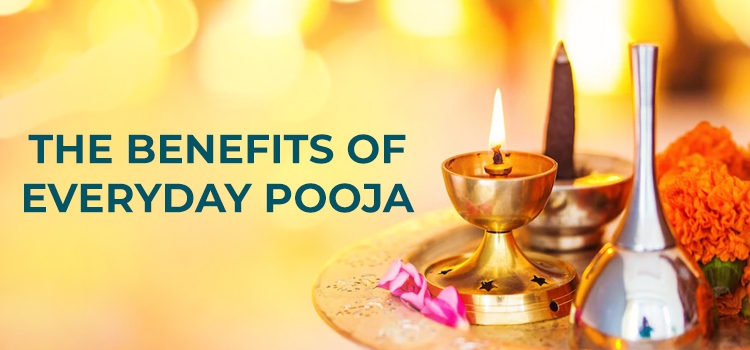Benefits of Everyday Pooja
What is Pooja?
Practicing Hindus believe in doing daily Pooja. Pooja is nothing but ritual worship of the divine. It can be done through prayers, invocations, songs, and rituals. All these enable one to establish a spiritual connection with god.
There are many gods and goddesses – 33 crores, to be precise - in Hinduism. People tend to worship only the deities who they feel directly influence their lives. They choose to worship one or more of these deities and perform rituals that can enable them to connect with them.
By calling upon these gods, they hope to get their blessings for wish fulfillment and protection from dangers. To do daily Pooja, one needs an image or other symbol of the god. It can be an idol or a picture. It represents the deity, and devotees believe that it contains the deity’s cosmic energy. As the devotee’s prayers are directed at this icon, it becomes a focal point for communicating with the deity. The objects serve as receptacles for the deity’s spiritual energy.
There are many kinds of Poojas that Hindus perform, like Shiva Pooja, Vishnu Pooja, Saraswati Pooja, Durga Pooja, Lakshmi Pooja, Vastu Pooja, etc. The Vedas, Puranas, Itihasa, and Upanishads, and even the great epics, Mahabharata and the Ramayana, emphasize the importance of performing Pooja to please the gods.
Poojas are also performed during auspicious events like birthdays, marriages, and the launch of new business or professional ventures. One can perform them at temples, homes, temples, or other venues where the ceremony takes place. However, there is no obligation to perform Poojas. One can perform them on a daily basis, or one can offer prayers on certain special occasions.
When it comes to the Pooja rituals, there are differing methods or schools of thought. There are Nigama rituals and Agama rituals. The former includes fire or Agni without an image or idol, while the latter includes the idol or image.
During the Pooja, the devotee lights an oil or ghee lamp, chants Pooja Mantras, and sings Vedic hymns praising god. Then the devotee offers Neivedya in the form of fruits and sweets to the deity. After prayers, these become purified and are distributed as Prasadam (blessed or holy food) to all.

The Significance of Pooja
Pooja is a symbolic offering of one’s whole mind and body, which include one’s thoughts, actions, desires, and possessions. This is done in the spirit of devotion and surrender. The worshipper receives whatever comes in return as a gift from the deity. Pooja may have originated from Tantric worship. However, one can discern elements of both Vedic sacrifices and Tantric rituals.
An individual or a group of people can perform Poojas. A priest can perform Pooja on behalf of the worshipper, too. Major Poojas are usually performed by priests.
Today, Poojas have supplanted Vedic sacrifices like Homas and Yagnas as the major form of Hindu worship, as even lay people can practice it without the help of a priest. It is a domestic sacrifice performed by householders as part of their daily devotional service.
In Vedic rituals, people invoke the gods to intercede in their favor for gaining wealth, progeny, good health, a life partner, jobs, success in education and court cases, and for protection from enemies and negative energies like the evil eye and black magic, etc. There are also rituals for attaining union with the Supreme or Moksha (salvation). The Vedic philosophy that underlies a ritual is to achieve Dharma (religion), Kama (sensual pleasures), Artha (Economic prosperity), and Moksha (liberation).
Poojas in Temples and Homes
Poojas can be conducted in temples, homes, and public spaces.
The Hindu belief is that if a temple’s idols are not cared for well, the deity will leave the temple. For this reason, priests live within the temple premises and take care of the deities’ needs. They conduct Poojas at sunrise, noon, sunset, and midnight. Not everyone visits the temple daily; one can worship at home, too, if one has a Pooja room or area. Rather than congregational worship, it is the individual’s offering to god that is the essential aspect of a Pooja. Most people do daily Pooja at home.
The temple is the earthly abode or seat of a deity. Here, the deity receives and blesses devotees. So, temples are sanctified places where gods accept human offerings and people can experience the presence of the divine. The architecture of many temples is often grand, like palace architecture. This is because the gods are regarded as royalty. A temple is usually dedicated to one main deity.
Most Hindus have a Pooja room in their homes with idols of various deities. They also go to temples to worship, mostly on special occasions like religious festivals. It is commonly believed that praying in temples is more effective then praying at home.
Ritual Poojas should ideally be conducted by experienced Brahmins or priests who know Vedic rituals and Mantras.
· A proper home or temple Pooja includes many steps. First, the deity is invited to the devotee’s home as a guest, then the devotee honors the deity as an important guest. The devotee also sings Stotras or Vedic hymns and offers food (Neivedya) to the deity. Items needed for the Pooja are Kalash, coconut, vermilion (kumkum), water, flowers, chandan, and betel leaves. Usually, there are 16 steps involved in a full Pooja.
Benefits of Pooja
- Doing daily Pooja has many benefits.
- It can ward off negative energies. This can bring peace and prosperity. During Pooja, people often chant ‘Gayatri Mantra’. It is the mother of the Vedas and supposedly destroys all sins.
- It can eliminate sorrows and facilitate spiritual development. Doing Pooja increases good thoughts, positivity, and spiritual vibrations.
- To enhance the benefit of Pooja, one can do spiritual practice and vows. Meditation, fasting, prayer, and chanting Mantras can purify us and help us to consume more spiritual energy released by the Pooja.
- Rituals like Pooja inculcate good habits and bring order to life. Do Pooja regularly, and you can develop a positive and powerful mindset.
- Doing Pooja helps you to start your day on a note of positivity. It gives us the strength to deal with problems.
- Poojas create a sense of harmony within us. The Aartis and chanting induce calmness and peace. It has a positive effect on the body, mind, and soul.
- Pooja can help ward off evil eyes. When people buy something costly like a car or a house, they first do a Pooja to protect them from harm.
- Poojas are done to cure or gain relief from diseases. Worship acts like a placebo. Feeling the divine presence around us makes us stronger.
- Roots and traditions are what keep us grounded. It is why elders or parents conduct Poojas daily at home so that their children will observe and continue the rituals after they have gone. Forgetting God is the first step toward moral and material decay.
- Pooja cleanses the home of evils.



















